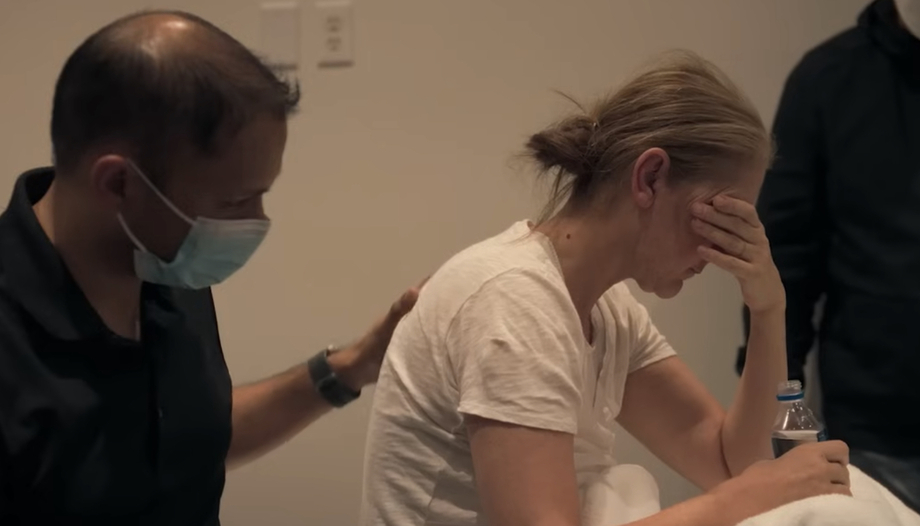You have to be very brave to do what the Canadian singer has done in her documentary "I am: Céline Dion" (Prime). His testimony fills with dignity the disease and pain. Taboo subjects in our western society, but which must be talked about.
The film, directed by Irene Taylor, shows us the most human face of the successful and multimillionaire artist: without makeup, in everyday clothes, without any glamour, the person in her crudest reality. A crudeness that comes from suffering for 17 years from a rare syndrome known by its acronym SPR (Stiff Person Syndrome) that causes muscle stiffness and painful spasms that incapacitate her not only to continue with her musical career as an international star but also for the most basic chores of ordinary life.
"I am" allows us to admire her beauty, her success and her prodigious voice with fragments of her best performances and, at the same time, to contemplate the same person in her moments of failure, of pain, of uncertainty. Which of Céline's two stories is the good one and which is the bad one? Can the two be separated? What is more admirable about her, her incredible voice modulation while interpreting My heart will go on Or the indescribable groan with which he endures the terrifying spasmodic crisis that, for six interminable minutes, he shows us in his documentary?
A single story, a single person endowed with infinite dignity in any circumstance, in any situation, because pain, illness or moral suffering are part of human life, of every human life, and are not incompatible with happiness.
In a world overflowing with ibuprofen and paracetamol, the slightest pain seems unbearable. We also have an appetite for so-called "soul medicines" such as anxiolytics or antidepressants, because we have lowered the threshold of psychological suffering to a minimum.
I have always been struck by the testimony of missionaries working in the poorest and most abandoned areas of the planet when they emphasize the joy of the people they serve as opposed to the sadness of the people of our first world. Also paradoxical is the essential joy of children who have suffered from a disability from a very young age or that of cloistered nuns whose lives are filled with deprivation.
Could it be that, by trying to flee at all costs from any suffering, what we actually achieve is to live it with more anguish? What is worse, the pain or the fear of pain? What produces more suffering, contemplating the hypodermic needle approaching the arm or the prick itself, thanks to which we can avoid illness and even death?
Avoiding even the slightest pain ends up working against ourselves, impairing our ability to cope with it when it does present itself in a serious way. To remove suffering from our lives prevents us from maturing and understanding our human nature and, therefore, our vulnerability. That's why I think this documentary is so necessary, because it unmasks the falsity of this sick world of instagrammable happiness that drives so many to despair and even suicide. I am Celine gives us a bath of humanity in the face of the bubble of vanity to which social networks have led us.
And no, it is not a matter of basking in the suffering of the rich and famous to make our gray life more bearable, nor of extolling suffering out of a kind of masochism, but of contemplating it and facing it, without hiding it, as a mystery that belongs to the essence of man. A mystery that is illuminated in the light of Jesus Christ. He, as the Good Samaritan, teaches us how to alleviate the pain of those who suffer around us. That is why accompanying, caring and healing have historically been verbs elevated to a heroic degree by those who believed that "you did it to me"; and, on the other hand, the Crucified One invites us to be sharers in his sufferings and to complete with our own suffering what is lacking in his.
At Salvifici DolorisIn his letter, St. John Paul II summed up this double aspect of the meaning of suffering: "Christ, at the same time, taught mankind to do good with suffering and to do good to those who are suffering".
Céline Dion's pain, like yours or mine, can be transformed into life with the power of Jesus. It is the power of giving oneself for others, or, as one of our beloved singer's greatest hits says, to give oneself for others, The power of love.
Journalist. Graduate in Communication Sciences and Bachelor in Religious Sciences. He works in the Diocesan Delegation of Media in Malaga. His numerous "threads" on Twitter about faith and daily life have a great popularity.








